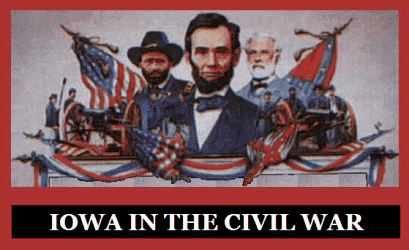The Globe Gazette
Mason City, Cerro Gordo County, Iowa
Monday, June 01, 1953
Mason City Centennial Edition, Section 3
1865: THEY MARCH WITH GEN. SHERMAN TO THE SEA
[Section 3, Page 11] Several from Cerro Gordo County went with Gen. Sherman on his famous march to the sea, among them Capt. H. I. Smith.
The records show that 17 Iowa regiments were with the general on this expedition and members of another, the 5th Iowa, were released from a war prison at Columbia, S. C., by Sherman's army.
It was one of these prisoners, Maj. S. H. M. [Samuel Hawkins Marshall] Byers, who, upon hearing about Sherman,wrote the words of the poem, "Sherman's March to the Sea."
Later, when Lt. Tower of Ottumwa, was exchanged for a southern prisoner and allowed to go free, he carried away with him in a wooden leg, replacing one he lost in battle, letters and secret papers as well as a copy of the song, "Sherman's March to the Sea."
Marched to Sea
Meanwhile Sherman and his men had marched to the sea and presented Savannah, Ga., as a Christmas present to the North. From Savannah Sherman's victorious army marched northward through the Carolinas to meet Gen. Ulysses S. Grant who was pressing southward to Richmond.
On Thursday, Feb. 16, 1865, Sherman's men went into camp on the west bank of the Congaree River directly opposite Columbia, the capital of South Carolina.
Mason City's Edith Rule and W. J. Peterson, who heads the Iowa State Historical Society, in their book, "True Tales of Iowa," tell the story of the rivalry between two Iowa regiments in a race to place their flags over that city when it surrendered.
A Great Honor The following morning the city was to surrender to Col. George Stone and this regiment, the 30th Iowa. But Maj. H. C. McArthur of the 13th Iowa heard Gen. Sherman say it would be a great honor to the men who first entered the city and unfurl the Stars and Stripes on the historic old state house.
Maj. McArthur and other officers got permission from the regimental commander, Gen. William Belknap, to attempt the feat for the honor of the 13th. Eighteen men and three officers reached the other side of the river in a leaky boat, fearful at all times they would meet a burst of fire from the Confederates.
The Iowa men crept into the town, took a horse and buggy by force, dumping the driver and his goods into the road, and the officers with the color bearer drove to the capitol. Just two blocks from the state house was a squad of Confederate cavalry, who fired upon them. Then, thinking the main body of the Union Army was coming, they turned and fled.
Had Two Capitols

The Iowans found Columbia had two capitols, an old one and new structure, yet unfinished. They planted the flag on both. At that very house Col. Stone of the 30th was receiving the surrender of the city from the mayor. Soon the flag of the 30th went up on the flag poles. The men who put them there swore they never saw the colors of the 13th. Weeks later, when in camp at Cheraw, S. C., the boys of Stone's regiment gave back the 13th's flag.
The prisoners at Columbia were released, among them Maj. Byers who heard Sherman's troops marching into town, singing his song, "And Sherman Marched Down to the Sea."
* * *
SHERMAN'S MARCH TO THE SEA
Our camp-fires shone bright on the mountain
That frowned on the river below,
As we stood by our guns in the morning,
And eagerly watched for the foe;
When a rider came out of the darkness
That hung over mountain and tree,
And shouted, 'Boys, up and be ready!
For Sherman will march to the sea!'
Then cheer upon cheer for bold Sherman
Went up from each valley and glen,
And the bugles re-echoed the music
That came from the lips of the men;
For we knew that the stars in our banner
More bright in their splendor would be,
And that blessings from Northland would greet us,
When Sherman marched down to the sea.
Then forward, boys! forward to battle!
We marched on our wearisome way,
We stormed the wild hills of Resaca —
God bless those who fell on that day!
Then Kenesaw, dark in its glory,
Frowned down on the flag of the free;
But the East and the West bore our standard
And Sherman marched down to the sea.
Still onward we pressed, till our banners
Swept out from Atlanta's grim walls,
And the blood of the patriot dampened
The soil where the traitor-flag falls;
We paused not to weep for the fallen,
Who slept by each river and tree,
Yet we twined them a wreath of the laurel,
As Sherman marched down to the sea.
Oh, proud was our army that morning,
That stood where the pine darkly towers,
When Sherman said, 'Boys, you are weary,
But to-day fair Savannah is ours!'
Then sang we the song of our chieftain,
That echoed o'er river and lea,
And the stars in our banner shone brighter
When Sherman marched down to the sea.
~ Samuel Hawkins Marshall Byers NOTE: Samuel Hawkins Marshall "Marsh" Byers also wrote the poem "The Song of Iowa."
Hawkins photograph courtesy of Globe-Gazette
Transcription and note by Sharon R. Becker, November of 2014
Added: 6 February 2015
Added: 6 February 2015


